The global marine energy market is projected at USD 2.7 billion in 2025 and is anticipated to reach USD 5.8 billion by 2035, growing at a compound annual growth rate (CAGR) of 8.1% over the forecast period. A saturation point analysis provides insights into the stages where market expansion may encounter natural limitations due to technological, infrastructural, or regulatory constraints. In the early phase, from USD 1.8 billion to USD 2.7 billion, the market exhibits steady growth as pilot projects, government-backed initiatives, and private investments lay the foundation for marine energy deployment, indicating that saturation is minimal and adoption potential remains high.
Between USD 2.9 billion and USD 3.9 billion, the market approaches intermediate saturation levels in certain regions, where deployment is constrained by site availability, high capital costs, and grid integration challenges, though demand continues to rise as new projects are initiated in untapped coastal areas. In the later stage, from USD 4.2 billion to USD 5.8 billion, the market moves closer to saturation points in mature regions with limited expansion scope, yet technological improvements, modular energy systems, and international collaboration help sustain growth and push the effective saturation threshold higher.
The saturation point analysis demonstrates that while early and mid-period growth is largely unconstrained, mature regions may experience capacity limits, emphasizing the need for innovation, strategic site selection, and policy support to maintain long-term expansion. This perspective equips investors, policymakers, and developers with a clear understanding of growth ceilings and opportunities for sustained revenue generation through 2035.
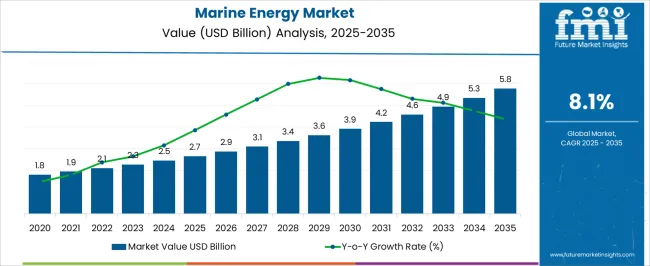
| Metric | Value |
|---|---|
| Marine Energy Market Estimated Value in (2025 E) | USD 2.7 billion |
| Marine Energy Market Forecast Value in (2035 F) | USD 5.8 billion |
| Forecast CAGR (2025 to 2035) | 8.1% |
The marine energy market is closely influenced by five interconnected parent markets that collectively drive its adoption and long-term growth. The largest contributor is the renewable energy generation market, which accounts for about 35% share, as tidal, wave, and ocean current energy technologies provide reliable, predictable, and sustainable power sources for coastal and island regions. The offshore engineering and marine infrastructure sector contributes around 25%, driven by the design, construction, and maintenance of marine energy converters, subsea cabling, and floating platforms required for efficient energy capture and transmission. The energy storage and grid integration market holds close to 15% influence, supported by the need for advanced battery systems, smart grids, and energy management solutions that stabilize intermittent marine energy supply and ensure continuous electricity delivery.
The government policy and environmental regulation sector adds nearly 12%, as policy incentives, renewable energy targets, and environmental impact assessments create favorable conditions for marine energy adoption and long-term project viability. The research, development, and innovation ecosystem contributes close to 8%, as universities, laboratories, and private enterprises focus on improving turbine efficiency, reducing costs, and enhancing durability in harsh marine environments. The distribution of market influence shows that renewable energy generation and offshore infrastructure form the backbone of the marine energy market, while storage, regulatory support, and technological innovation continue to enhance operational efficiency and commercial viability.
The marine energy market is gaining traction as a viable contributor to the global renewable energy mix, driven by mounting concerns over fossil fuel dependency and increasing investments in sustainable alternatives. With governments and private stakeholders intensifying support through funding mechanisms and policy frameworks, marine energy technologies are progressing from pilot to commercialization phases. The sector’s growth is reinforced by the consistent and predictable nature of oceanic resources, which offers a distinct advantage over intermittent sources like solar and wind.
Advanced research initiatives and infrastructure upgrades have further enabled deployment across coastal and island regions with high energy import costs. Despite technical challenges and high capital expenditure, the market outlook remains positive due to increasing environmental regulations and the urgency of achieving net-zero targets.
Strategic collaborations between technology developers and utility providers, along with favorable feed-in tariffs in certain geographies, are expected to accelerate adoption. Overall, the marine energy market is anticipated to expand steadily, supported by innovation, grid integration improvements, and long-term sustainability goals.
The marine energy market is segmented by type, application, and geographic regions. By type, marine energy market is divided into Wave Energy, Tidal Energy, Ocean Thermal Energy Conversion (OTEC), and Salinity Gradient Power (SGP). In terms of application, marine energy market is classified into Power generation, Desalination, and Others. Regionally, the marine energy industry is classified into North America, Latin America, Western Europe, Eastern Europe, Balkan & Baltic Countries, Russia & Belarus, Central Asia, East Asia, South Asia & Pacific, and the Middle East & Africa.
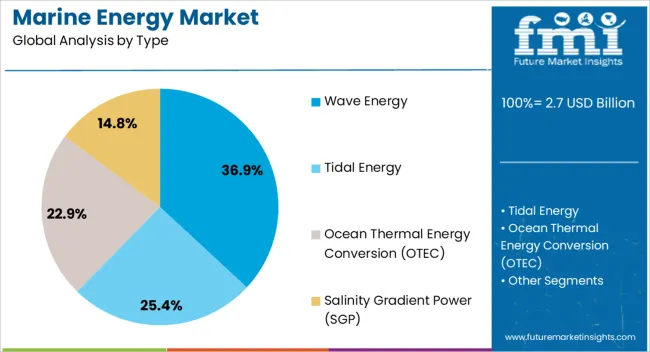
The wave energy segment currently accounts for approximately 36.9% of the marine energy market, reflecting its early-stage technological maturity and growing deployment potential. Development in this segment has been facilitated by consistent energy density in ocean wave patterns, which provides a reliable basis for scalable power generation. Numerous pilot projects across Europe, Asia-Pacific, and North America have validated performance metrics and operational viability, encouraging further investment.
The segment’s share is bolstered by increasing interest from coastal nations aiming to diversify their renewable portfolios while enhancing energy security. Technological advancements in point absorbers, oscillating water columns, and attenuators have improved efficiency and survivability in harsh marine environments.
Furthermore, wave energy systems present minimal visual and land use impact, aligning with environmental permitting requirements and stakeholder interests. With growing support from both public and private sectors, the wave energy segment is expected to maintain a substantial share and experience consistent growth throughout the forecast horizon.
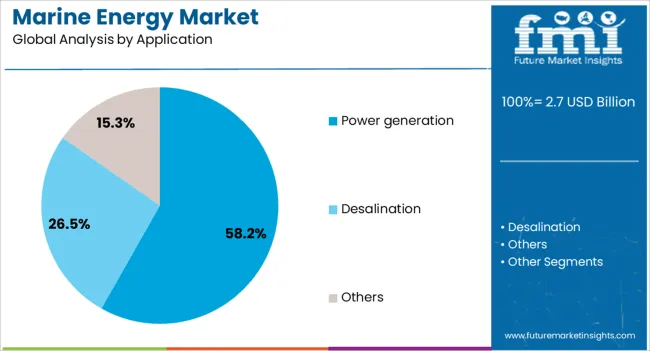
Power generation leads the marine energy market by application, representing approximately 58.2% of total utilization. This segment has benefited from rising electricity demand, decarbonization targets, and grid modernization efforts that accommodate distributed renewable inputs. Marine energy technologies are increasingly being integrated into regional energy systems to supplement traditional sources and enhance supply reliability, particularly in remote or island communities.
The power generation segment’s share is also supported by the strategic focus of developers on utility-scale applications, which offer favorable economies of scale and long-term power purchase agreements. Technological advancements have improved conversion efficiency and system durability, enabling wider deployment under diverse marine conditions.
Policy incentives, such as renewable energy credits and feed-in tariffs, have further accelerated adoption in key markets. As marine energy systems mature and their levelized cost of electricity continues to decline, the power generation application is anticipated to remain the primary growth driver, sustaining its dominant position in the marine energy market.
The marine energy market is being shaped by rising interest in renewable ocean-based energy, integration of advanced turbine and conversion technologies, supportive government incentives, and expansion in offshore and island applications. Coastal and island regions are increasingly adopting marine energy solutions for reliable, low-carbon power generation. Technological advancements in turbines, converters, and monitoring systems are enhancing efficiency and commercial viability.
Policy frameworks and funding initiatives reduce investment risks and encourage deployment. Together, these dynamics are driving market growth, fostering infrastructure development, and positioning marine energy as a key component of global renewable energy strategies and offshore electrification efforts.
The market is witnessing growth due to increasing interest in renewable energy derived from oceans, including tidal, wave, and current energy. Governments and private investors are promoting marine energy projects to diversify electricity generation and reduce dependency on fossil fuels. Coastal regions with high tidal ranges and wave potential are being targeted for pilot projects and commercial deployments. Energy produced from marine sources offers predictable generation patterns and long-term sustainability. Rising demand for clean, reliable energy solutions and strategic energy security initiatives are encouraging investments, fostering consistent market growth, and driving technological exploration in the marine energy sector.
Marine energy systems are increasingly incorporating advanced turbine designs, power take-off mechanisms, and energy conversion technologies to improve efficiency and reliability. Wave energy converters, tidal stream turbines, and oscillating water column systems are being optimized for maximum energy capture. Innovations in materials, corrosion resistance, and mooring solutions enhance durability in harsh marine environments. Integration with grid infrastructure, energy storage, and smart monitoring systems ensures efficient transmission and utilization of generated power. By improving system performance and reducing operational costs, these technological advancements are enhancing adoption, enabling commercial viability, and expanding applications of marine energy across coastal and island regions.
Supportive government policies, grants, and incentive programs are significant drivers of marine energy adoption. Countries in Europe, North America, and Asia-Pacific are implementing feed-in tariffs, tax incentives, and renewable energy mandates to promote marine energy projects. Research funding and public-private partnerships are accelerating pilot programs, infrastructure development, and technology commercialization. Regulatory frameworks addressing environmental impact, site licensing, and safety standards are facilitating project implementation. Policy support reduces investment risk, encourages private sector participation, and promotes sustainable development. These initiatives are expanding project pipelines and fostering market growth, particularly in regions with high marine energy potential and strong renewable energy agendas.
Marine energy adoption is increasing in offshore installations and island regions where conventional grid access is limited. Tidal and wave energy solutions are providing stable and reliable electricity for coastal communities, ports, and offshore industries. Integration with microgrids and hybrid renewable systems enhances energy security and reduces dependence on diesel or fossil fuel-based generation. Regional collaborations, strategic partnerships, and local infrastructure development are enabling efficient deployment and maintenance of marine energy systems. Rising energy demand in remote and island locations is creating sustainable revenue streams, supporting market expansion, and reinforcing marine energy as a viable alternative for distributed and resilient power generation.
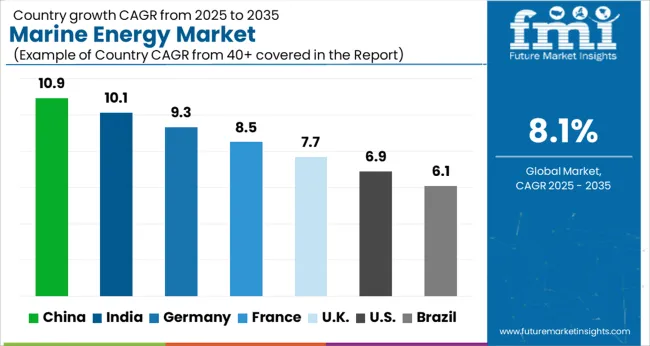
| Country | CAGR |
|---|---|
| China | 10.9% |
| India | 10.1% |
| Germany | 9.3% |
| France | 8.5% |
| UK | 7.7% |
| USA | 6.9% |
| Brazil | 6.1% |
The global marine energy market is projected to grow at a CAGR of 8.1% from 2025 to 2035. China leads with 10.9%, followed by India at 10.1%, Germany at 9.3%, the UK at 7.7%, and the USA at 6.9%. Growth is driven by increasing investment in renewable energy, rising electricity demand, and technological improvements in tidal and wave energy conversion. BRICS countries, particularly China and India, are scaling pilot projects, local manufacturing, and grid integration to accelerate adoption. OECD nations such as Germany, the UK, and the USA emphasize research and development, system reliability, and regulatory frameworks to enhance deployment efficiency and energy output. The analysis spans over 40+ countries, with the leading markets detailed below.
The marine energy market in China is projected to grow at a CAGR of 10.9% from 2025 to 2035, driven by the country’s extensive coastline, government support for renewable energy, and increasing focus on reducing carbon emissions. Investments in tidal, wave, and offshore current energy projects are expanding, with domestic manufacturers and research institutions developing high-efficiency turbines and energy conversion systems. Coastal regions are integrating marine energy into local grids, supporting sustainable electricity generation for industrial and residential use. Policies promoting clean energy adoption, incentives, and subsidies encourage private sector participation. Technological advancements in energy capture and storage are further strengthening market growth.
The marine energy market in India is expected to grow at a CAGR of 10.1% from 2025 to 2035, supported by rising energy demand, a long coastline, and government initiatives for renewable energy. Tidal and wave energy projects are being developed along the western and eastern coasts, with focus on grid integration and efficient energy conversion technologies. Public-private partnerships and foreign investments enhance project financing and technical expertise. Government incentives, renewable energy targets, and environmental regulations encourage adoption of clean energy solutions. Rising awareness of sustainable energy and climate change mitigation further drives marine energy development.
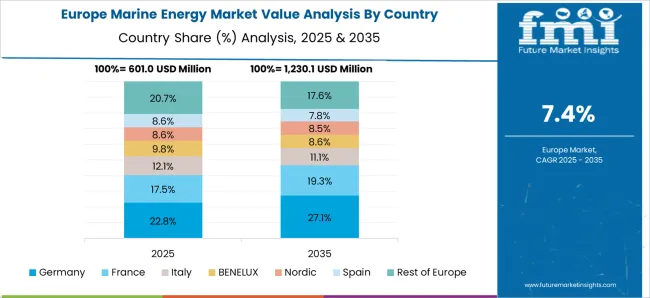
The marine energy market in Germany is projected to grow at a CAGR of 9.3% from 2025 to 2035, fueled by the country’s commitment to renewable energy transition and North Sea offshore energy projects. Investments in tidal and wave energy converters, along with research in high-efficiency turbines, enable integration into the national grid. Policy frameworks, including feed-in tariffs, renewable targets, and environmental regulations, create favorable conditions for marine energy adoption. Collaboration between research institutions, private developers, and government bodies supports technological innovation. Germany’s expertise in offshore engineering and grid infrastructure ensures reliable implementation and long-term growth.
The marine energy market in the UK is expected to grow at a CAGR of 7.7% from 2025 to 2035, driven by abundant tidal and wave resources and strong governmental support for offshore renewable energy. Development of commercial-scale tidal lagoons, wave converters, and floating energy platforms is increasing, with integration into regional and national grids. Financial incentives, renewable energy targets, and low-carbon policies encourage private sector investment. Research and pilot projects from universities and technology developers accelerate innovation in turbine design, energy conversion, and storage. Consumer and industrial demand for clean energy further strengthens adoption prospects.
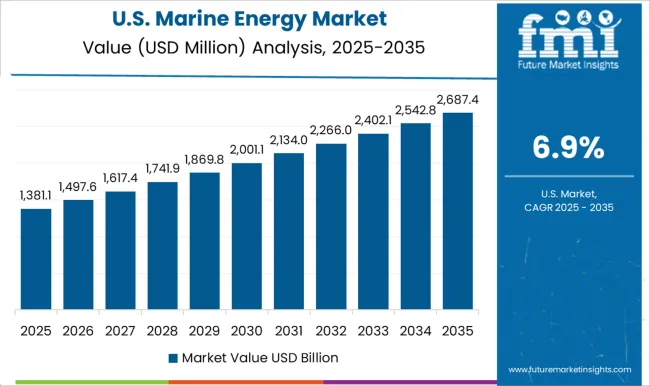
The marine energy market in the USA is projected to grow at a CAGR of 6.9% from 2025 to 2035, supported by government initiatives, coastal energy demand, and environmental regulations. Development of tidal, wave, and ocean current energy projects is underway along the Atlantic, Pacific, and Gulf coasts. Federal and state-level incentives, grants, and renewable energy mandates encourage private sector investment. Technological advancements in turbine efficiency, energy conversion systems, and grid integration are enhancing project viability. Increasing focus on decarbonization and sustainable energy sources is driving demand from utilities and industrial consumers, ensuring steady market expansion.
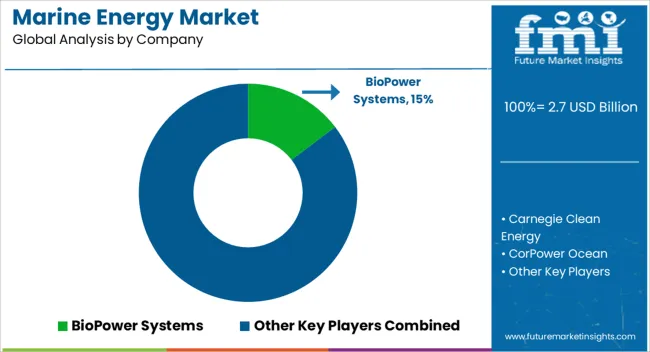
Competition in the marine energy market is shaped by technology efficiency, project scalability, and regulatory compliance. BioPower Systems, Carnegie Clean Energy, CorPower Ocean, Minesto, Marine Energy Group, Nova Innovations, Ocean Renewable Power Company, Orbital Marine Power, SSE Renewables, and SINN Power lead by offering wave energy converters, tidal turbines, and hybrid marine energy solutions designed for grid integration and off-grid applications. Product differentiation is achieved through advanced hydrokinetic technologies, floating and fixed-platform designs, energy storage integration, and predictive maintenance systems, ensuring high energy conversion efficiency and operational reliability in varying marine conditions. Mid-tier and regional players focus on cost-effective pilot projects, modular deployments, and specialized solutions for coastal communities and islands, providing flexibility in installation and scalability for future expansion. Emphasis is placed on environmental monitoring, system durability, and remote performance tracking to ensure consistent energy output and minimal ecological impact. Strategies across leading companies prioritize research and development, strategic partnerships, and turnkey project delivery, including site assessment, installation, and post-deployment maintenance. Digital modeling, adaptive turbine control, and real-time monitoring platforms are leveraged as key differentiators to optimize performance, reduce downtime, and ensure compliance with maritime regulations. Differentiation is further strengthened through modular turbine designs, innovative anchoring systems, and integration with hybrid renewable setups for enhanced energy reliability. Companies aim to balance cost, efficiency, and environmental responsibility, ensuring marine energy systems deliver continuous, sustainable power while supporting regional energy policies. The market reflects strong competition based on technological maturity, operational efficiency, and ecological impact management, where global and regional players maintain leadership by delivering reliable, scalable, and high-performing marine energy solutions. Continuous advancements in turbine design, energy conversion technologies, and grid integration, coupled with supportive policy frameworks, drive long-term growth. The marine energy market demonstrates a dynamic landscape shaped by innovation, regulatory adherence, and increasing demand for renewable marine-based electricity.
| Item | Value |
|---|---|
| Quantitative Units | USD 2.7 Billion |
| Type | Wave Energy, Tidal Energy, Ocean Thermal Energy Conversion (OTEC), and Salinity Gradient Power (SGP) |
| Application | Power generation, Desalination, and Others |
| Regions Covered | North America, Europe, Asia-Pacific, Latin America, Middle East & Africa |
| Country Covered | United States, Canada, Germany, France, United Kingdom, China, Japan, India, Brazil, South Africa |
| Key Companies Profiled | BioPower Systems, Carnegie Clean Energy, CorPower Ocean, Minesto, Marine Energy Group, Nova Innovations, Ocean Renewable Power Company, Orbital Marine Power, SSE Renewables, and SINN Power |
| Additional Attributes | Dollar sales, share, technology type adoption, regional deployment, project pipeline, competitor landscape, pricing trends, government incentives, grid integration, maintenance and operation costs, environmental compliance, energy output efficiency. |
The global marine energy market is estimated to be valued at USD 2.7 billion in 2025.
The market size for the marine energy market is projected to reach USD 5.8 billion by 2035.
The marine energy market is expected to grow at a 8.1% CAGR between 2025 and 2035.
The key product types in marine energy market are wave energy, tidal energy, ocean thermal energy conversion (otec) and salinity gradient power (sgp).
In terms of application, power generation segment to command 58.2% share in the marine energy market in 2025.






Our Research Products

The "Full Research Suite" delivers actionable market intel, deep dives on markets or technologies, so clients act faster, cut risk, and unlock growth.

The Leaderboard benchmarks and ranks top vendors, classifying them as Established Leaders, Leading Challengers, or Disruptors & Challengers.

Locates where complements amplify value and substitutes erode it, forecasting net impact by horizon

We deliver granular, decision-grade intel: market sizing, 5-year forecasts, pricing, adoption, usage, revenue, and operational KPIs—plus competitor tracking, regulation, and value chains—across 60 countries broadly.

Spot the shifts before they hit your P&L. We track inflection points, adoption curves, pricing moves, and ecosystem plays to show where demand is heading, why it is changing, and what to do next across high-growth markets and disruptive tech

Real-time reads of user behavior. We track shifting priorities, perceptions of today’s and next-gen services, and provider experience, then pace how fast tech moves from trial to adoption, blending buyer, consumer, and channel inputs with social signals (#WhySwitch, #UX).

Partner with our analyst team to build a custom report designed around your business priorities. From analysing market trends to assessing competitors or crafting bespoke datasets, we tailor insights to your needs.
Supplier Intelligence
Discovery & Profiling
Capacity & Footprint
Performance & Risk
Compliance & Governance
Commercial Readiness
Who Supplies Whom
Scorecards & Shortlists
Playbooks & Docs
Category Intelligence
Definition & Scope
Demand & Use Cases
Cost Drivers
Market Structure
Supply Chain Map
Trade & Policy
Operating Norms
Deliverables
Buyer Intelligence
Account Basics
Spend & Scope
Procurement Model
Vendor Requirements
Terms & Policies
Entry Strategy
Pain Points & Triggers
Outputs
Pricing Analysis
Benchmarks
Trends
Should-Cost
Indexation
Landed Cost
Commercial Terms
Deliverables
Brand Analysis
Positioning & Value Prop
Share & Presence
Customer Evidence
Go-to-Market
Digital & Reputation
Compliance & Trust
KPIs & Gaps
Outputs
Full Research Suite comprises of:
Market outlook & trends analysis
Interviews & case studies
Strategic recommendations
Vendor profiles & capabilities analysis
5-year forecasts
8 regions and 60+ country-level data splits
Market segment data splits
12 months of continuous data updates
DELIVERED AS:
PDF EXCEL ONLINE
Marine Nanocoating Market Size and Share Forecast Outlook 2025 to 2035
Marine-grade Polyurethane Market Size and Share Forecast Outlook 2025 to 2035
Marine Electronics Market Size and Share Forecast Outlook 2025 to 2035
Marine Toxin Market Size and Share Forecast and Outlook 2025 to 2035
Marine Thermal Fluid Heaters Market Size and Share Forecast Outlook 2025 to 2035
Marine Nutraceutical Market Size and Share Forecast Outlook 2025 to 2035
Marine Power Battery System Market Size and Share Forecast Outlook 2025 to 2035
Marine Life Raft Market Size and Share Forecast Outlook 2025 to 2035
Marine Trenchers Market Size and Share Forecast Outlook 2025 to 2035
Marine Electronics Tester Market Size and Share Forecast Outlook 2025 to 2035
Marine Steering Systems Market Size and Share Forecast Outlook 2025 to 2035
Marine & Dock Gangways Market Size and Share Forecast Outlook 2025 to 2035
Marine HVAC System Market Size and Share Forecast Outlook 2025 to 2035
Marine Outboard Engines Market Size and Share Forecast Outlook 2025 to 2035
Marine Stabilizers Market Size and Share Forecast Outlook 2025 to 2035
Marine Fuel Injection System Market Size and Share Forecast Outlook 2025 to 2035
Marine Propulsion Engine Market Size and Share Forecast Outlook 2025 to 2035
Marine Protein Hydrolysate Market Size and Share Forecast Outlook 2025 to 2035
Marine Fin Stabilizer Market Size and Share Forecast Outlook 2025 to 2035
Marine Extract Market Size and Share Forecast Outlook 2025 to 2035

Thank you!
You will receive an email from our Business Development Manager. Please be sure to check your SPAM/JUNK folder too.
Chat With
MaRIA